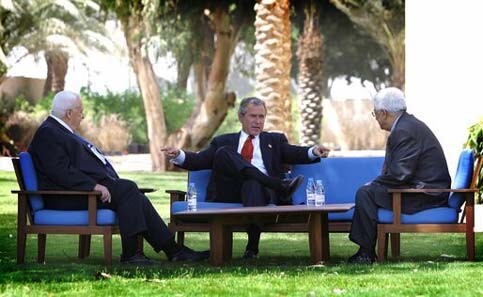The Electronic Intifada 12 September 2003

President George W. Bush, center, discusses the Middle East peace process with Prime Minister Ariel Sharon of Israel, left, and Palestinian Prime Minister Mahmoud Abbas in Aqaba, Jordan, Wednesday, June 4, 2003. (White House/Paul Morse)
In the United States, the resignation of Palestinian Prime Minister Mahmoud Abbas is viewed as a “blow” to President Bush’s road map for peace.
However, the momentous crisis represented by the Abbas resignation may actually signal the end of the era in which hopes for peace were predicated on the division of the land between an Israeli and a Palestinian state.
Among Americans, conventional wisdom holds that Abbas failed because he was too weak to crack down on Hamas and because Palestinian President Yasser Arafat stood in his way.
The idea that the future of an entire region is determined by the individual fortunes of a mediocrity such as Abbas, or a compulsive failure such as Arafat, is absurd. However, along with the position that progress depends entirely on the behavior of an occupied population and not on the Israeli occupiers, this obsession with Palestinian personalities has been the bedrock of the U.S. approach to the conflict.
Despite its serious flaws, Bush’s road map could have led to an end of the conflict if it had been implemented as written. But from the beginning, Washington sat on its hands as Israeli Prime Minister Ariel Sharon openly flouted the plan with assassinations and new settlements, despite a unilateral Palestinian cease-fire.
Indeed, during the 10 years since the Oslo accords were signed, Washington’s unbroken refrain has been that the Palestinians must “do more,” while Israel gobbled up the land and more than doubled the number of settlers colonizing the occupied territories.
Despite the fact that most Palestinians and Israelis, the Arab League, the UN and the U.S. all support a two-state solution, there appears to be no constellation of political forces that can check the Israeli establishment and Palestinian extremist groups who are united in their determination to block such an agreement.
If Bush will not stand up to Israel, there is no Democrat vying to replace him likely to be any more courageous. The dysfunctional Arab League has little influence. The European Union is too divided to present an alternative, and under Kofi Annan, the UN has abdicated its central role in resolving the conflict. In other words, there is no political force ready, willing and able to enforce a two-state solution.
Israel’s government, Palestinian radicals and too many ordinary people on both sides have already concluded that there is no possibility of a negotiated peace in the foreseeable future and that the conflict must simply play itself out according to the fundamental balance of forces.
Israel’s leaders delude themselves that they can “defeat” the Palestinians. Although they can cause immense suffering and destruction, they certainly will not break the Palestinian will to resist. Similarly, Palestinian extremists labor under the illusion that Israel can be driven out by armed struggle alone.
Israel and Hamas, in effect, have formed a bloody and effective alliance to prevent negotiations and intensify the conflict at every stage.
Others, such as the Palestinian Authority, much of the international community and moderate elements in Israel will try to press on with the negotiations that started a decade ago. However, there is little reason to hope that simply more of the same will suddenly produce results after a decade of total failure.
If Israel’s colonization of the occupied territories, which within a few years will make the creation of a Palestinian state a practical impossibility, cannot be stopped, the alternative cannot be interminable bloodshed. We must not allow despair over the dismal prospects for a negotiated solution to make continued conflict appear either desirable or inevitable.
Rather, we will have to embrace a “South African solution”—bringing Palestinians and Israelis together in one political entity where they enjoy equal rights and freedom. This is decidedly a fringe idea among Israelis and Palestinians alike, although it is advocated by prominent people in both societies, such as Edward W. Said, prominent spokesperson for the Palestinian cause in the U.S., and Meron Benvenisti, an Israeli historian and longtime critic of Israel’s policies in the occupied areas.
If South Africans, after generations of white supremacy, could adopt a system of “one person, one vote,” why can’t Israelis and Palestinians?
One crucial difference thus far is that unlike Nelson Mandela’s African National Congress, Palestinian leaders have never offered Israelis such a vision of reconciliation. Whatever its rhetoric, the Palestinian national movement has been an expression of ethno-nationalism, almost as strongly as Zionism has been.
Most Israelis remain deeply committed to maintaining a Jewish-dominated state, and fear being “swamped” by Palestinians. It is up to Palestinians and their supporters to demonstrate that such fears are irrational, while demanding that Israelis give up their monopoly on power and consent to the creation of a genuinely democratic state dedicated to all its citizens.
To convince Israelis of the plausibility of a single state, in which both peoples can continue to express their national identities not as rivals but as partners, there must first be widespread and genuine commitment to this vision among Palestinians. Under conditions of oppression, it typically falls to the weaker party to articulate a moral vision, and take the lead in offering a meaningful prospect of reconciliation, to the dominant group.
We should be under no illusion that embracing the one-state solution is an easy choice for Palestinians, let alone Israelis. On the contrary, it entails a political movement of immense complexity and against powerful opposition. Yet this struggle may soon, if it has not already, become unavoidable.
This article first appeared in The Chicago Tribune on 12 September 2003.





